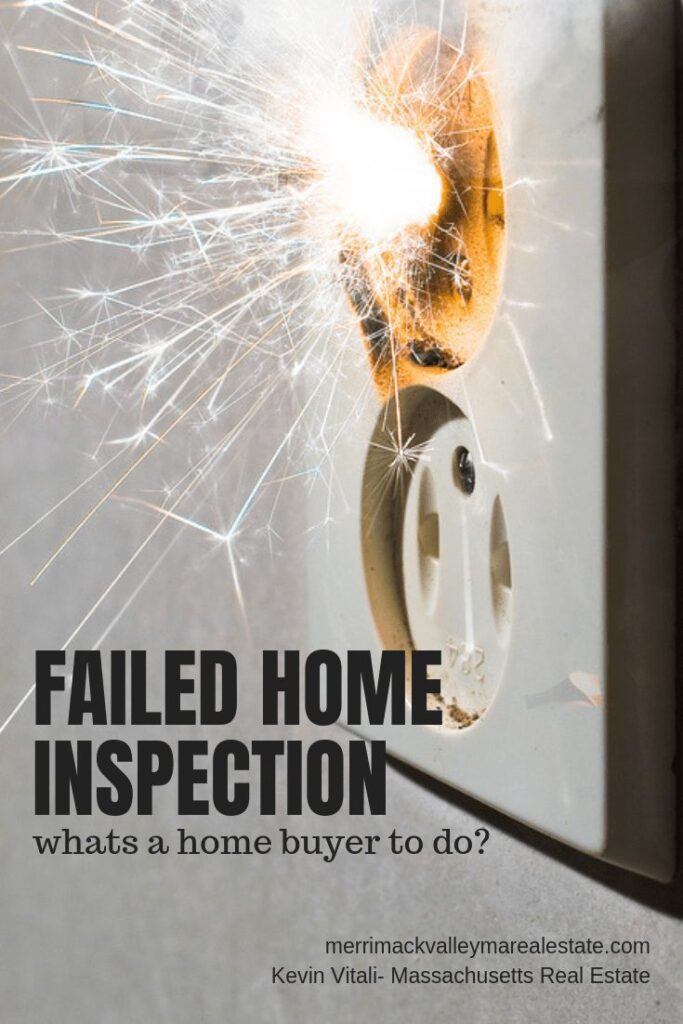 You have spent months searching for the perfect home…. that cute house with the perfect yard…. now its time for the home inspection. Hopes were high, but you end up with a failed home inspection.
You have spent months searching for the perfect home…. that cute house with the perfect yard…. now its time for the home inspection. Hopes were high, but you end up with a failed home inspection.
Well not really, home inspections are not pass or fail. But, in your eyes that perfect home has failed the inspection.
A home inspection is a visual inspection of a home’s systems, including electrical, plumbing, heating, etc…., along with the soundness of the structure and the safety of the home for its occupants. The inspection gives you an overview of the condition of the property while pointing out items that may need immediate repair or repair in the very short term as well as some long-term maintenance.
Since a home inspection is not pass or fail it is your determination to accept the house as is, request repairs or walk away if you believe the home failed home inspection.
Set Expectations for Your Home Inspection
Prior to your home inspection, it is important to talk to the real estate agent representing you about expectations. First, no home is going to be perfect. Just like buying a used car, it’s going to have some dings and dents as well as some repairs.
Every home buyer’s tolerance level will be different as well. Some buyers are quite skilled at home repairs or have family members in the trades while others have absolutely no home repair skills at all.
Start by requesting a seller’s disclosure on the property and read through it thoroughly. Many, but not all homeowners will have one filled out. It covers the major systems and information about the home.
They may have pointed out issues they already knew about the home like occasional puddling of water in the basement during the most severe storms….. Or maybe they will disclose that when they bought the house mold was discovered in the attic and it was mitigated by the previous seller and they have all the documentation.
Other things to consider when setting home inspection expectations:
Cash on Hand
Many home buyers do not have the cash on hand to do immediate repairs after closing on a new home while others may have some set aside.
Current Market Conditions
Current market conditions drive so much of the real estate home buying and selling process. At this point, we are in a strong sellers’ market with many sellers dictating terms on their homes. Alternately 7-10 years ago the home buyers reigned supreme. As a buyer, you can push much harder on a home inspection in a buyer’s market than you can in a seller’s market. In a seller’s market, it is step aside there are two more buyers right behind you.
Market Segment
Given the market segment you are looking in…. location/price/amenities/size there will be certain expectations. For example right now if you are looking at a 1500 square-foot home in the Tewksbury Real Estate market in $400,000 to $47,.000 range you will expect that some moderate to significant work will have to be done to that home. If your expectation is a home in tip-top shape you would look for the same home in the 450,000 or a much smaller home in the same price. There is a correlation between the price of the home, the size of the home, the amenities of the home and what you can expect for the condition.
Failed Home Inspection: No Home Inspection Is Going To Be Perfect
As I stated before no home is going to be perfect. Maintenance is ongoing and will still be ongoing after you purchase the home.
With that said, you should expect your home to:
Function Properly
Expect all systems to function properly. While the systems can be older or even past there “useful life” you still expect them to function the way they were intended to and last for a reasonable period past the closing date.
So unless the home is being called out as being a handyman special or needing rehab, you should expect the HVAC, plumbing, electrical, appliances, roofing, siding and windows, etc…to be fully functional for a period of time after the closing.
Structurally Sound
As a home buyer, you should expect the home to be structurally sound. The home’s foundation, lolly columns, support beams, sill, joists, etc…. should be reasonably sound. Basically, the home shouldn’t be falling down nor any immediate repairs need to be done in fear of the safety of the home’s occupants or there to be an ongoing structural issue that needs to be corrected.
Safe
It is a reasonable expectation that your home is safe from hazards like asbestos, mold, radon and other hazards either in the material or environment. The home should not cause any harm to its occupants.
Realize There Is A Difference
So realize there is a difference between a small nuisance repair and a major repair or replacement
For example, all poured concrete foundations will get cracks. It is normal for there to be small settlement cracks. But a foundation crack can also be a structural issue if the crack is over 1/8 of an inch wide and the two sides of the crack are not flush with each other. This can indicate a potential structural issue.
An older furnace that is still doing its job is very different than say a furnace with a cracked heat exchanger that may need a significant repair or replacement.
Failed Home Inspection, What Should I Do?
Again there is really no pass or fail when it comes to your home inspection. But in your eyes, the home has a failed home inspection. But before you get all crazy there are some steps you should take before walking away from a home. Chances are you pass on this home the next home may have issues to.
First, read your contact and the home inspection contingency paragraph. Here in Massachusetts, most contracts spell out that the buyer has a certain number of days to do the home inspection and the home inspection is to the buyer’s complete satisfaction. The buyer can pull out for any reason if the seller is notified in a timely manner and as spelled out in the contract. Know what your rights are under the contract.
The Devil Is In The Details
Read through the inspection report very carefully. What is the inspector actually saying. Is the item in question in complete failure or does it need some improvements or minor repairs.
As a real-life example, a home inspector might recommend a house needs gutters and consider installing them. This tends to get a lot of home buyers thinking the home is in danger with no gutters. They insist on the homeowner spending a couple of thousand dollars installing them. Yet the home seller has lived there for 15 years absolutely no need for gutters.
I personally hate gutters, if I don’t need them, I don’t want them. They can be a maintenance nightmare, always cleaning clogged gutters as well as increasing the possibility of ice damming.
Dig further into the report is the lack of gutters causing any water penetration issues? If not you probably don’t need them. But read the details of the report. Are the absence of gutters causing a loss of enjoyment of the home, creating an unsafe environment or causing the structure of the house to fail?
If not you are going to have a hard time getting the seller to set you up with brand new gutters.
Why Would A Home Fail A Home Inspection?
Usually, a buyer is willing to walk away from a home if significant, costly issues that require immediate attention arise. Or sometimes a long laundry list of smaller items that start totaling thousands of dollars that require immediate attention will cause a home buyer to have second thoughts.
Either way, it is not what you were expecting.
Make A List
As you go through the list, write down every item that causes concern for you. There should be 3 columns to your list:
Punch List Item You Are Willing To Take On
This could be something simple like replacing a kitchen outlet with a ground-fault GFCI outlet. A minor replacement many homeowners can do. Or maybe the home inspector has recommended you cut back the landscaping away from the house. Again an afternoon spent in your yard with some garden shears.
Requires Further Investigation
Sometimes an inspector will call out a repair but you have no idea if it should be acted upon or how much it will cost. A very common item could be sloping floors.
Here in New England, our housing inventory is old. Many homes are pre-1920. Quite frankly older houses have sloping floors. It is very common. On occasion, I have had buyers bring in structural engineers because the home inspector made a big deal about it. The engineer says houses settle, this house isn’t going anywhere. Rarely are minor to medium-sloping floors an issue that needs to be dealt with. Nothing needs to be done.
No offense to home inspectors but many of them know a little about a lot of things but are not an expert in any. Call the expert get a definitive answer and actual costs to repair so you can make an educated decision.
Must Be Dealt With By Seller
In this category put the definite repairs you feel should be done by closing or at least a credit given back to you to do the repair immediately. There is a lot of obvious here. A leaking roof, a furnace with a cracked heat exchanger, significant mold in an attic or basement, etc…. These are the definitive items that will make you walk away from the home
Consult With Your REALTOR®, Home Inspector and Others
Talk with your agent if you are being represented by a buyer’s agent. Express your concerns and thoughts and have an open dialogue. Your agent can help lay out where your reality, in a given market, lies and help find contractors to talk to or get estimates from.
Clarify any items you are not sure of with your home inspector. A home inspector is not going to tell you whether you should buy a house or not but sometimes how you phrase a question can help you get to the bottom of a situation.
One of my favorite questions to ask is if this was your house is the “xxxxxxxxxx” something that needs immediate attention or something I can take care of down the road in a couple of years. Often you can get a home inspector to go into greater by detail by asking the right question….
Ask specific contractors questions about what is going on. Just talking to a contractor on the phone can put some of your fears to rest. Again ask questions!!
Talk to other homeowners. They can give you some insight.
When I purchased my first house it was a turn of the century colonial…. it was old. My inspector pointed out 51 items that were “deficient”. One in particular bothered me. I had a wrap-around staircase that went up 3 flights which had settled about 3 inches in a short distance. It was visibly noticeable.
After 5 years of owning the house and reselling it, guess how many items I repaired? About 30%. Did I do the staircase? No. But yet the house was still standing and worth about a hundred thousand more than I bought it for!
Really how important was the staircase settling? Talking to a few contract friends of mine they ensured me this was normal in a house this age and did not recommend doing anything to correct the problem.
Everything Is Negotiable
When it come to real estate almost everything is negotiable. This includes home inspection items that are deficient. So maybe that house you thought was perfect has some issues. Ask the seller to do the repair prior to closing.
The balance is in making reasonable requests. Hand them the home inspection list and say you want everything fixed, your probably not getting a new home.
But, point out that the furnace has a cracked heat exchanger (usually requires a new furnace) and that it causes a safety issue (carbon monoxide poisoning), there is 10 feet of termite damage to the sill and one joist that needs repair (structural issue) and the electric box has water coming in from the weather head (fire hazard)…. and you can probably get the home seller to get the work done.
You take on thousand or so of nit picky nuisance repairs and have the seller take on about $9,000-12,000 worth of major repairs.
Now that house with a failed home inspection doesn’t seem all that bad. You were able to get the seller to deal with all of the major issues. The issues that made the house unsafe and/or unsound for your family.
Choose Your Battles
By culling out the most serious and the most costly issues and not being nit picky, often you can achieve some sort of success negotiating with a seller. Not every seller will negotiate but many will.
As an agent when I am negotiating for a buyer, I will tell the listing agent what my buyer expects, why it is a problem and if need be, send documents stating it is an health or safety issue along with that segment of the home inspection report and photos.
If a home has a latent defect an agent is now obligated to disclose that issue to each and every new buyer that comes along. For big issues that would concern a lot of buyers, the seller will generally have to repair the issue or lower the price of the home to compensate for the required repair.
For example, radon for most people is a known carcinogen. In the 17+ years of being a real estate agent I have run into high, unhealthy levels of radon numerous times. In all those years, I have only come across one stubborn seller who refused to mitigate the issue for a buyer or subsequent sale. In the end, they had to put in a system to mitigate the radon, before the house was sold down the road.
Nothing ventured nothing gained. You just might get the seller to do the repairs that make the home acceptable to you.
Negotiating Home Inspection Repairs
There are several ways to approach the negotiations for home inspection repairs. Not every seller wants to take the time to find and have a professional do the repairs. Try to stay flexible. The important thing is to get the repair done.
Request items to be repaired before closing
Ask all the repairs to be done before closing. For buyers with limited funds, they don’t have to worry about coming up with the money to do a significant repair or replace an item.
Price of home reduced
You can request the price of the home to be reduced to reflect any repairs that need to be done. If you have the cash on hand this is a good way to choose your vendor and decide exactly how the work gets done.
Closing cost credit
Asking the seller to pay some or all of your closing costs to cover any repairs, helps put cash in your pocket at closing. This allows you to get the repairs done shortly after closing.
Escrowing money at closing so the repairs can be done after closing
This one get complicated if you are financing a home. The banks generally don’t like to see money held in escrow for any major repairs. While it can be a possibility try to avoid it.
Negotiate From Knowledge
Knowledge is power. Getting exact quotes and knowing exactly why an issue is or potentially can be a big problem allows you to negotiate from a position of strength. That is why it is important to talk to the appropriate professionals and get quotes and detailed write ups.
The more information you and your agent have the better negotiating position you are in.
If a home inspection issue is serious and is documented properly, a real estate agent in Massachusetts is now obligated to disclose the issue to every subsequent buyer that comes along. They most likely will counsel their seller they need to fix the problem or make an appropriate adjustment in a homes price.
Why not deal with the buyer in front of you?
Final Thoughts On The Failed Home Inspection
Don’t go off the deep end if you think you have a failed home inspection. Regroup, gather information and consider renegotiating with the seller.
If they took on all or most of the repairs will the house now be acceptable to you? Or is there something about the report you can’t accept that you need to walk away from?
Most reasonable sellers will come to some sort of compromise that is acceptable to a buyer if it is discovered their home has serious latent defects they were not aware of in their home.
- Xavier De Buck 8 Reasons to Get A Home Inspection
- Bill Gassett How To Negotiate Repairs After Your Home Inspection
- Joy Bender Inspecting a Condominium
- Maria Mastrolonardo The Importance of a Home Inspection
This post, Failed Home Inspection!! What’s A Home Buyer To Do? was provided by Kevin Vitali of EXIT Group One Real Estate. Kevin is happy to answer any of your questions regarding the sale or buying of a home and can be reached at 978-360-0422 at any time.
Real Estate Services in the following areas: Northeast Massachusetts, Merrimack Valley, North Shore and Metrowest. Including the following communities and the surrounding area- Amesbury, Andover, Billerica, Burlington, Chelmsford, Dracut, Groveland, Haverhill, Lowell, Melrose, Merrimac, Methuen, Middleton, North Andover, North Reading, Reading, Stoneham Tewksbury, Tyngsborough, Wakefield, Wilmington, Westfor





